kung fu tea nutrition pdf
Kung Fu Tea offers a variety of nutritional options, balancing taste and health․ With calories ranging from 80 to 470 per serving, it caters to diverse dietary needs, providing essential macronutrients like carbs, protein, and fat, while also offering low-sugar alternatives for health-conscious consumers․
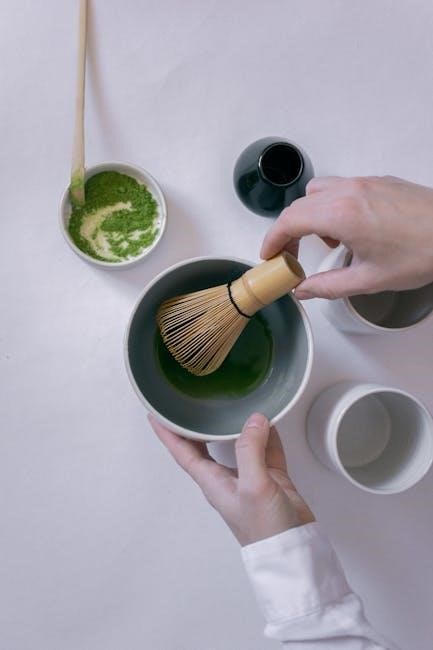
Calorie Content in Kung Fu Tea
Kung Fu Tea drinks range from 80 to 470 calories per serving, depending on the variety and toppings, making them suitable for various dietary preferences and goals․
Calories in Popular Kung Fu Tea Drinks
Popular Kung Fu Tea drinks vary in calorie content, with Peach Oolong Tea containing around 80 calories and Taro Slush Medium 70 offering 470 calories․ Honey Green Tea Medium with 100 sugar has 150 calories, while Brown Sugar Wow Boba Medium provides 160 calories․ Oolong Milk Tea Medium with 50 sugar contains 240 calories, and Chobani Oat Milk Chai Milk Tea Hot with 0 sugar has 140 calories․ These options cater to different preferences, from low-calorie choices like Peach Oolong Tea to indulgent selections such as Taro Slush․ The calorie count is influenced by factors like sugar levels, milk content, and toppings, making Kung Fu Tea a flexible choice for those monitoring their diet․
Comparison of Calorie Counts Across Different Tea Varieties
Kung Fu Tea varieties show a notable variation in calorie content․ Peach Oolong Tea is among the lowest with approximately 80 calories, while Taro Slush Medium 70 is significantly higher at 470 calories․ Honey Green Tea Medium with 100 sugar contains 150 calories, and Brown Sugar Wow Boba Medium offers 160 calories․ Oolong Milk Tea Medium with 50 sugar has 240 calories, and Chobani Oat Milk Chai Milk Tea Hot with 0 sugar provides 140 calories․ These differences highlight how calorie counts can vary widely based on tea type, sugar levels, and added ingredients like milk or boba, offering options for both health-conscious drinkers and those seeking indulgence․
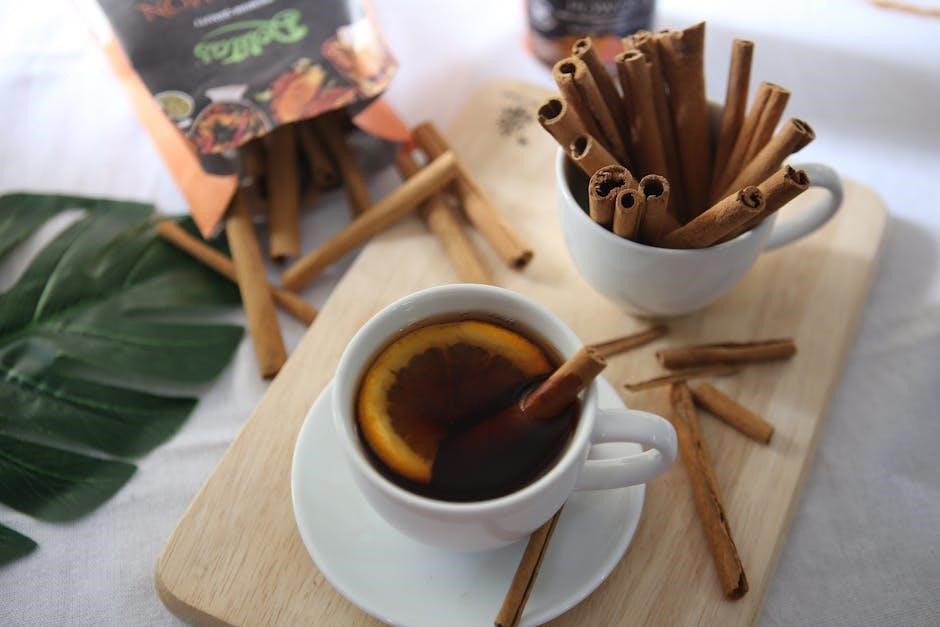
Macronutrient Breakdown
Kung Fu Tea primarily offers carbohydrates, with variations in protein and fat across different varieties․ This breakdown helps consumers make informed choices based on their dietary preferences and goals․
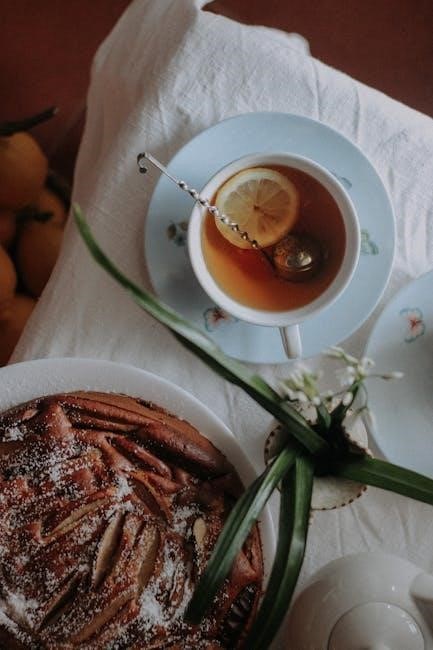
Carbohydrates in Kung Fu Tea
Kung Fu Tea drinks vary in carbohydrate content, ranging from 27g in Peach Oolong Tea to 111g in Taro Slush․ Milk-based teas and slushes tend to have higher carbs due to added sugars and dairy․ For example, a medium Taro Slush contains 111g of carbs, while a Peach Oolong Tea has 27g․ The milk cap alone adds 26g of carbs, significantly increasing the total․ These variations cater to different dietary preferences, allowing consumers to choose options that align with their carb intake goals․ This range makes Kung Fu Tea a flexible choice for those monitoring their carbohydrate consumption, whether for low-carb diets or energy needs․
Protein Content in Kung Fu Tea Drinks
Kung Fu Tea drinks generally contain low amounts of protein, making them suitable for those monitoring their protein intake․ For instance, a medium Peach Oolong Tea has 0g of protein, while a Taro Slush contains 1g․ These low levels are due to the primary ingredients like tea, milk, and sugar, which are not significant sources of protein․ However, some options like the Brown Sugar Wow Boba offer slightly higher protein content at 2g per medium serving․ This variation allows customers to choose based on their dietary preferences, whether they prefer minimal protein or a bit more in their drink․
Fat Content in Kung Fu Tea Varieties
The fat content in Kung Fu Tea drinks varies depending on the type and size of the beverage․ For example, a medium Peach Oolong Tea contains 0g of fat, while a Taro Slush Medium 70 has 3g․ Some milk-based options, like the Brown Sugar Wow Boba, can have higher fat content, reaching up to 11g per medium serving․ These variations are influenced by ingredients such as milk, sugar, and toppings․ Generally, most Kung Fu Tea varieties remain relatively low in fat, making them a good choice for those monitoring their fat intake․ However, options with added toppings or creamy elements may contain slightly higher amounts, allowing customers to tailor their drink to their dietary preferences․
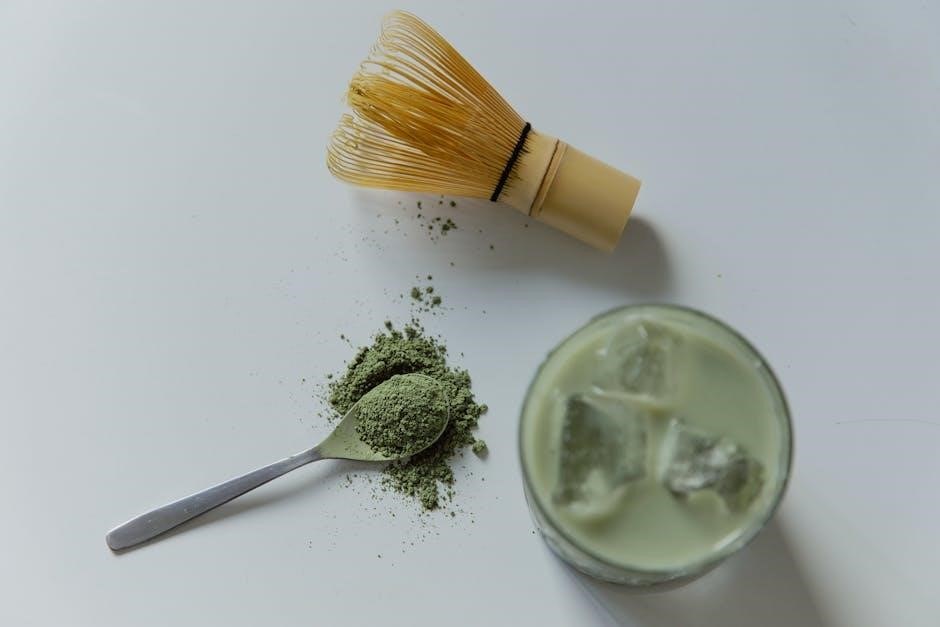
Health Benefits of Kung Fu Tea
Kung Fu Tea offers antioxidants that boost metabolism and improve heart health․ Its moderate caffeine content enhances alertness and mental focus, aligning with balanced nutrition goals․
Antioxidants in Kung Fu Tea
Kung Fu Tea is rich in antioxidants, which play a crucial role in combating free radicals and promoting overall health․ These antioxidants, particularly found in oolong, green, and black tea varieties, help boost metabolism and support heart health․ Regular consumption may reduce oxidative stress and inflammation, contributing to a stronger immune system․ Certain flavors, like peach oolong, not only offer a refreshing taste but also provide a natural source of antioxidants․ With options ranging from 80 to 470 calories per serving, Kung Fu Tea allows consumers to enjoy antioxidant benefits while managing their dietary preferences․ The combination of natural ingredients and essential nutrients makes it a healthy choice for those seeking a balanced beverage option․
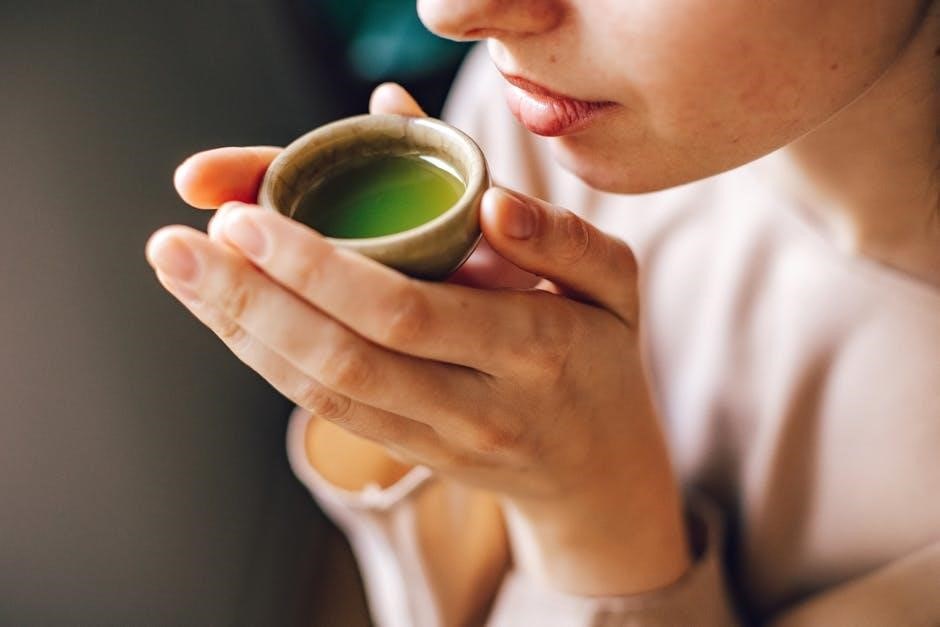
Caffeine Content and Its Effects
Kung Fu Tea beverages contain varying levels of caffeine, primarily from tea varieties like oolong, green, and black tea․ A medium serving of oolong milk tea, for instance, may have around 50-70 mg of caffeine, while green tea options might range from 30-50 mg․ Caffeine in these drinks can enhance mental alertness and boost metabolism, making them popular among those seeking a energizing pick-me-up․ However, excessive consumption may lead to side effects like insomnia or jitteriness, especially in sensitive individuals․ Balancing caffeine intake with dietary preferences is key, as higher sugar levels in some drinks may amplify caffeine’s effects․ Moderation is advisable to maximize benefits while minimizing potential drawbacks․
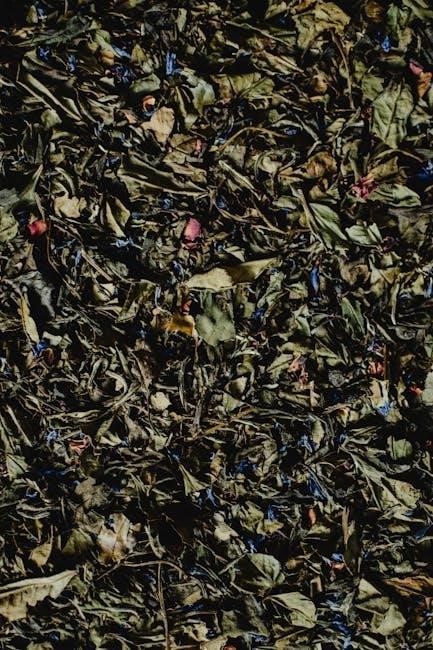
Toppings and Their Nutritional Impact
Toppings like boba, milk caps, and whipped cream significantly increase calorie, carb, and sugar content in Kung Fu Tea drinks, impacting overall nutritional balance and dietary preferences․
Popular Toppings and Their Caloric Contribution
Popular toppings like milk caps, boba, and whipped cream significantly increase the caloric content of Kung Fu Tea drinks․ A milk cap adds around 26 grams of carbs, contributing approximately 114 calories when combined with a drink․ Boba typically adds 100-150 calories due to its tapioca pearls, which are high in carbohydrates․ Whipped cream adds an extra 100 calories, while popping pearls contribute about 30-40 calories․ These toppings not only enhance flavor but also significantly impact the overall nutritional profile, making them a key consideration for those monitoring calorie and sugar intake․ Understanding their caloric impact helps consumers make informed choices aligned with their dietary goals․
Nutritional Changes Due to Toppings
Toppings significantly alter the nutritional profile of Kung Fu Tea drinks․ Milk caps, for instance, add 26 grams of carbs and 114 calories, while boba contributes 100-150 calories due to its high carb content․ Whipped cream adds approximately 100 calories and 3 grams of fat․ Popping pearls add 30-40 calories, increasing sugar intake․ These additions not only boost calorie and carb counts but also introduce minimal protein and fiber․ For example, a 30-sugar matcha milk cap jumps to 111 carbs, highlighting the dramatic impact of toppings․ Such changes are crucial for those monitoring carbs, calories, or fat, making mindful topping choices essential for maintaining dietary goals․ Understanding these nutritional shifts helps consumers make informed decisions about their Kung Fu Tea purchases․
Resources for Kung Fu Tea Nutrition
Kung Fu Tea provides a detailed nutrition guide in PDF format, offering insights into calorie, carb, and fat content․ Apps like Nutritionix Track also help users monitor their intake, ensuring transparency and informed choices for health-conscious consumers․
Kung Fu Tea Nutrition PDF Guide
The Kung Fu Tea Nutrition PDF Guide is a comprehensive resource that details the nutritional information for all menu items․ It includes calorie breakdowns, macronutrient content, and comparisons across different tea varieties․ Users can find specific data on carbs, proteins, and fats for popular drinks like milk teas, slushes, and lemonades․ The guide also highlights the impact of toppings and sugars on nutrition, offering insights for healthier choices․ Regularly updated, it reflects the latest menu additions and formula changes․ This PDF is a valuable tool for anyone tracking their diet or managing dietary preferences, providing transparency and clarity in an easy-to-access format․
Tracking Nutrition with Apps
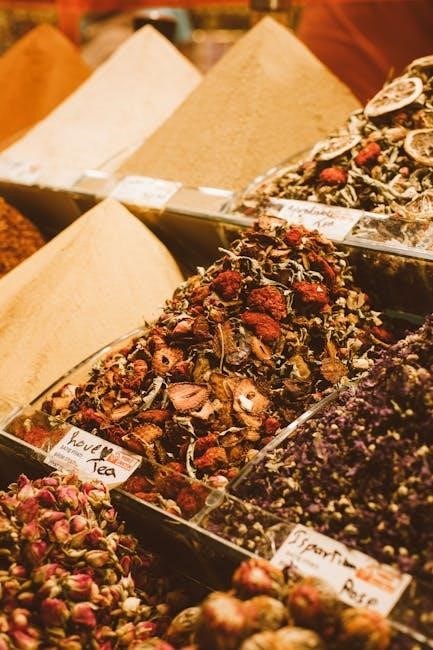
Tracking nutrition with apps like Nutritionix Track provides detailed insights into Kung Fu Tea’s menu․ Users can log popular items such as Brown Sugar Wow Boba (160 cal) and Chobani Oat Milk Chai Milk Tea (140 cal)․ These apps offer precise data on calories, carbs, fats, and proteins, helping users monitor their intake․ They also allow comparisons of different tea varieties, such as Peach Oolong Tea (80 cal) and Taro Slush (470 cal)․ By integrating with the Kung Fu Tea Nutrition PDF Guide, apps enable seamless tracking for health-conscious consumers․ This digital approach supports informed decisions, making it easier to balance indulgence with dietary goals․ Apps are a convenient tool for maintaining nutritional awareness while enjoying Kung Fu Tea․
